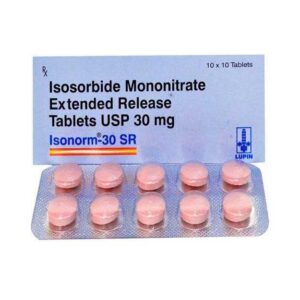ISOSORBIDE MONONITRATE + PROLOGED RELEASE ISORBIDE
Isosorbide Mononitrate: Isosorbide Mononitrate is a drug that belongs to a class of medications called nitrate vasodilators. It is primarily used to prevent angina attacks, which are chest pain or discomfort caused by reduced blood flow to the heart muscles.
The mechanism of action of Isosorbide Mononitrate involves its conversion into nitric oxide (NO) within the body. Nitric oxide acts as a potent vasodilator, relaxing and widening the blood vessels. This process improves blood flow to the heart, reducing the workload on the heart muscles and relieving angina symptoms.
The dose of Isosorbide Mononitrate varies depending on the individual and the severity of the condition. Typically, the starting dose for immediate-release tablets is 20 mg to be taken two to three times daily. The dose may be increased gradually up to a maximum of 120 mg per day, if necessary. The extended-release tablets are usually taken once daily, with the initial dose ranging from 30 mg to 60 mg, which may be increased up to 120 mg per day as required.
While Isosorbide Mononitrate is generally well-tolerated, it may cause some side effects. Common side effects may include headaches, dizziness, lightheadedness, and flushing. These side effects are usually mild and temporary. However, if these symptoms persist or worsen, it is important to consult a healthcare professional.
In rare cases, Isosorbide Mononitrate may cause more serious side effects such as vision changes, irregular heartbeat, fainting, or swelling of the face, lips, throat, or tongue. These symptoms require immediate medical attention.
It is essential to follow the prescribed dosage and adhere to the treatment regimen as directed by a healthcare professional. Additionally, individuals should avoid consuming alcohol while taking Isosorbide Mononitrate, as it may enhance the dizziness and lightheadedness caused by the medication.
Overall, Isosorbide Mononitrate is an effective medication for the prevention and treatment of angina attacks. It works by improving blood flow to the heart muscles, reducing symptoms and improving quality of life for individuals with angina.
Prologed Release Isorbide: Prologed Release Isorbide is a medication commonly prescribed for the treatment of angina pectoris, a condition characterized by chest pain due to reduced blood flow to the heart.
The main active ingredient in Prologed Release Isorbide is isosorbide mononitrate, which belongs to a class of drugs called nitrates. Nitrates work by relaxing and widening the blood vessels, allowing for better blood flow to the heart muscles. This helps to relieve chest pain and improve exercise tolerance in patients with angina.
The dose of Prologed Release Isorbide can vary depending on the severity of the patient’s condition and their individual response to the medication. It is typically taken once daily, with the dosage ranging from 30 to 240 milligrams. The medication is designed to be slowly released over a long period, ensuring its effects last throughout the day.
Like all medications, Prologed Release Isorbide can cause side effects. Common side effects may include headaches, dizziness, and flushing of the face. These side effects are usually mild and temporary. However, if they persist or worsen, it is important to consult a healthcare professional.
Rare but more serious side effects may include low blood pressure, rapid heartbeat, and fainting. If any of these symptoms occur, immediate medical attention should be sought.
Prologed Release Isorbide should be used with caution in patients with certain medical conditions such as low blood pressure, heart failure, or liver disease. It may also interact with other medications, so it is important to inform the prescribing healthcare professional about any other medications or supplements being taken.
Overall, Prologed Release Isorbide is an effective medication for the treatment of angina pectoris. It works by improving blood flow to the heart, relieving chest pain, and increasing exercise tolerance. However, like all medications, it should be used under the guidance of a healthcare professional and its potential risks and benefits should be carefully assessed for each individual patient.

